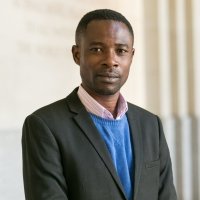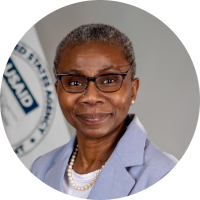WEBCAST | Violent Extremism in West Africa: Are Current Responses Enough?
On June 2, 2020, the Wilson Center Africa Program hosted a webcast event on “Violent Extremism in West Africa: Are Current Responses Enough?” Ms. Gamuchirai Mhute, Africa Program Assistant, offered welcome remarks and introduced the SVNP, under whose banner this event was being held. Dr. Monde Muyangwa, Africa Program Director, moderated the event and Ms. Leanne Erdberg Steadman, Director of Countering Violent Extremism at the United States Institute of Peace (USIP); Mr. Osei Baffour Frimpong, Lead Regional Researcher and Conflict Analyst at the West Africa Network for Peacebuilding (WANEP) in Accra, Ghana and Southern Voices Network for Peacebuilding Scholar; and Ms. Vanita Datta, Senior Countering Violent Extremism, Preventing Violent Extremism, and Civ-Mil Advisor, U.S. Agency for International Development (USAID) joined as speakers. The event assessed the efficacy of current regional mechanisms in addressing the threat of violent extremism, their articulation and complementarity with international efforts, and proposed options to improve the regional response to violent extremism in West Africa.
Ms. Steadman began by discussing the drivers of recruitment to violent extremist organizations (VEO), which often cater to legitimate grievances, injustice, and repression felt by civilians. She emphasized that while violence is not the answer, it is important to consider what drives people to it. Insecurity and the perception of insecurity are on the rise, and there are three dynamics to this. The first is local sources of insecurity. When community security needs are not met, these lay the ground for recruitment to violent organizations. Civilians begin to wonder whether the state really cares about their security or just its own power, and terrorists take advantage of this divide. The second is intercommunal conflict, especially over resource management issues. Informal conflict resolution mechanisms between groups are breaking down, creating distrust, and making peacebuilding difficult. The third is whether people believe there is an avenue for change. Steadman then interrogated what is and is not working in countering violent extremism (CVE) efforts. What’s working is allowing civilians to decide their own future and good governance. What’s not working is under-scrutinized security assistance, and the heavy focus on eliminating today’s terrorists while not doing anything to stop tomorrow’s terrorists. Steadman recommended that policymakers focus on prioritizing local agency and support—not supplant—local peacebuilding mechanisms. She also recommended adjusting CVE narratives to recognize the humanity in affected people and communities (something VEO narratives already do), and improving state behavior towards its citizens by focusing on human security and the role of security services as protectors of the civilian population.
Mr. Frimpong examined regional CVE strategies with a focus on the ECOWAS Counter-Terrorism Strategy Implementation Plan, a key regional counterterrorism framework. The plan has three pillars: prevent violent extremism by adopting and implementing regulations, pursue rapid action against terrorist threats, and reconstruct societies damaged by terrorist activities. Frimpong assessed the key regional and international military responses, including the Multinational Joint Task Force, the G5 Sahel Force, the US Trans-Sahara Partnership, and the French Operation Barkhane. He noted that these responses have degraded some terrorist organizations and their capacities. Setting up local community units to prevent violent extremism and the role that West Africa and ECOWAS have played in building partnerships with civil society organizations (CSO) have succeeded in the past. In this regard, Frimpong highlighted ECOWAS’ partnership with the West Africa Network for Peacebuilding (WANEP) in establishing an early warning network as an example of a successful CSO partnership. However, Frimpong pointed out that there are many gaps in the existing frameworks for combating violent extremism. There is a lack of complementarity between the national and regional levels. West African efforts have not used existing local and traditional peacebuilding infrastructure, and have neglected critical stakeholders such as women and youth in the past. Overall, there is too much focus on military action and not enough on human security, and this could have long-term implications on the youth in the region. Finally, there is an unsustainable reliance on outside funding and assistance to counter terrorism. Frimpong offered several policy recommendations to address these gaps. He recommended harnessing local peacebuilding mechanisms and involving traditional authorities, women, and youth to build resilience at the local level. He also recommended that policymakers prioritize human security by focusing more on governance, institutions, youth unemployment, and resource depletion instead of solely military solutions. He also emphasized that each response has to be context-specific instead of following a one-size-fits-all approach to CVE.
Ms. Vanita Datta noted that her main concerns for the region are the short- and long-term impacts of the human trauma caused by violent extremism, democratic backsliding, and COVID-19. She cautioned that if violent extremism spreads to coastal areas, it could have devastating economic consequences, incite ethnic cleavages, and shift funds from development to security. Datta analyzed the factors driving violent extremism in West Africa, which are complex, diverse, and intertwined. She noted that in many cases violent extremism is a manifestation of deep grievances. Malign actors have exploited the internet to widen, enhance, and multiply these grievances. While religious ideology or grievances are not the primary causes of violence, extremists do exploit them. Datta underlined the importance of understanding, limiting, and degrading attempts at social fragmentation. Lessons learned include adapting policies to changing conditions; customizing CVE efforts for specific cohort groups, and local, national, and regional priorities; and leaving a light donor footprint. Datta noted that without closing justice and governance gaps, marginalization, resentment, and conflict will continue to grow; and that without adequate monitoring, corruption will grow, which is the spark that ignites recruitment by violent extremist organizations (VEO). There must also be stronger links between locally-driven short-term, mid-term, and long-term responses; and enhanced collaboration between national, regional, and international efforts—with local implementation. Turning to U.S. government (USG) engagement with CVE in West Africa, Datta reiterated that the Global Fragility Act provides critical guidance to USG CVE efforts in the region. The USG is building the capacity of regional organizations and supporting the G5 Sahel Force in their CVE planning. USAID has also committed millions of dollars to build resilience in the Sahel. The U.S. government supports enhancing the economic and health sectors via Power Africa, Prosper Africa, and the health, trade, and investment hubs. Datta reflected that these responses must be ongoing and involve stakeholders at all levels in order to be effective. She recommended addressing the human trauma of those affected by conflict, enhancing coordination between regional, national, and local entities, and focusing on the local. Datta closed by emphasizing that without a locally-grounded analysis, it is impossible to get an effective ground-up and a top-down response.
In the subsequent discussion, participants posed questions via Twitter and email regarding the impact of reduced military support from the U.S. on West African responses to CVE policy, whether people in West Africa and the Sahel see violent extremist groups as liberators, how the international community can leverage its influence to foster political will for better governance in West Africa, what West Africa’s priorities for countering VEOs are, and how COVID-19 will affect security issues in the region as donor budgets shrink.
The SVNP is a continent-wide network of African policy, research and academic organizations that works with the Wilson Center’s Africa Program to bring African knowledge and perspectives to U.S., African, and international policy on peacebuilding in Africa. Established in 2011 and supported by the generous financial support of the Carnegie Corporation of New York, the project provides avenues for African researchers and practitioners to engage with, inform, and exchange analyses and perspectives with U.S., African, and international policymakers in order to develop the most appropriate, cohesive, and inclusive policy frameworks and approaches to achieving sustainable peace in Africa.
This event was livetweeted and webcast. Follow the Africa Program Twitter account @AfricaUpClose and catch up on the conversation #ViolentExtremism
Selected Quotes
Osei Baffour Frimpong
“Number one, there is a need for the region to begin to harness existing local peacebuilding mechanisms in order to bolster resilience at the community level. This will help ensure inclusive participation of local populations and key actors at the local levelーtraditional authorities, women, and youth groupsーin order to bring them on board to play a critical role in harnessing resilience.”
“There’s also the need for us to prioritize human security in our counterterrorism strategy, because our challenges at the base, or at the heart of our regional vulnerabilities are largely issues related to governments’ capacity. We have institutional challenges, a number of our youth are unemployed, and we are also faced with the challenges of resource depletion, which is affecting the livelihood of the population. So if you have much of your strategy focused on the military, you’ll likely leave behind some of these things which are also important.”
“We need to promote context-specific responses to terrorism. The West African security narrative has largely been overgeneralized, and therefore, we seem to be focusing on the one-size-fits-all approach without looking at the context specifics. The level of vulnerabilities that is generating violent extremism or terrorism in Northeastern Nigeria is not the same as that of Burkina Faso.”
“Beyond the need to address the government’s challenges is the need to make space for youth participation in the peacebuilding and development of West Africa. That requires the need for us to look at our youth development agenda in order to create more platforms for them to contribute.”
Vanita Datta
“Lack of basic services tears the national fabric. Insecurity born out of fear—fear of the illicit actor across forest borders, fear of food insecurity, or fear of being violently marginalized by those with either a grievance, control, or greed mindset—are the ingredients for ethnically motivated violence and extremism.”
“There is no one path to violence or terrorism. However, violence and extremism analysis show a manifestation of deep grievances, and you all have, again, extrapolated on this. I will just say that these feelings of insecurity and injustice have been sort of widened, enhanced, and multiplied by a digital means and are gaining resonance, exploited by nefarious groups and malign actors, and have bolstered further under-confidence in government and outbreaks of violence.”
“Without a locally grounded analysis, without understanding local systems, without understanding how local systems and local communities lash up with their governments, we will not be able to get a ground-up and a top-down response that is effective.”
“What we have focused on is a journey to self-reliance. What is the capacity and the commitment of African governments and civil society to continue Africa’s response, especially West Africa’s response, to self-reliance. We cannot have a donor-donee relationship forever. We are dealing as equal partners with a proud and dignified nation, and community of nations.”
Leanne Erdberg Steadman
“So what’s working? Approaches that enable people to decide their own future—consultative processes, transparency, accountability, good governance—these may seem tired at the international level, but it’s actually what’s working at the local level. When we see people as partners and not enemies, we tend to be able to diffuse the ordinary types of conflict that end up being the schisms that violent extremist groups are capitalizing on.”
“Effective responses must include local level coordination, local mechanisms of transparency to local communities and populations, and should support, not supplant, local peacebuilding and conflict resolutions. Let me be clear this takes time and this takes effort: you have to sit and listen to communities, to a lot of different voices. You’ve got to sit with gatekeepers and you have to sit with the powerless, but we need to support African-led initiatives on these types of governance and security issues and leave room for the local nuance that’s invisible to us as outsiders.”
“[Violent extremist actors] cloak their hate and violence in sacred values like justice and righteousness, but they should not be the ones that have a monopoly on humanistic policies. We too can prioritize this, and it includes figuring out ways to disengage and reconcile with those who were formerly part of violent extremist groups.”
“The most effective counter-terrorism is to help governments improve their behavior and rebuild citizen trust. To support and repair the broken bonds of governance and positively impact the behavior of security actors. It’s to reinforce the idea that the state’s job is to protect people. To protect them against violence.”
The SVNP is a continent-wide network of African policy, research and academic organizations that works with the Wilson Center’s Africa Program to bring African knowledge and perspectives to U.S., African, and international policy on peacebuilding in Africa. Established in 2011 and supported by the generous financial support of the Carnegie Corporation of New York, the project provides avenues for African researchers and practitioners to engage with and exchange analyses and perspectives with U.S., African, and international policymakers in order to develop the most appropriate, cohesive, and inclusive policy frameworks and approaches to achieving sustainable peace in Africa.
Speakers

Lead Regional Researcher and Conflict Analyst, West Africa Network for Peacebuilding (WANEP), Ghana
Introduction

Moderator

Hosted By

Africa Program
The Africa Program works to address the most critical issues facing Africa and US-Africa relations, build mutually beneficial US-Africa relations, and enhance knowledge and understanding about Africa in the United States. The Program achieves its mission through in-depth research and analyses, public discussion, working groups, and briefings that bring together policymakers, practitioners, and subject matter experts to analyze and offer practical options for tackling key challenges in Africa and in US-Africa relations. Read more
